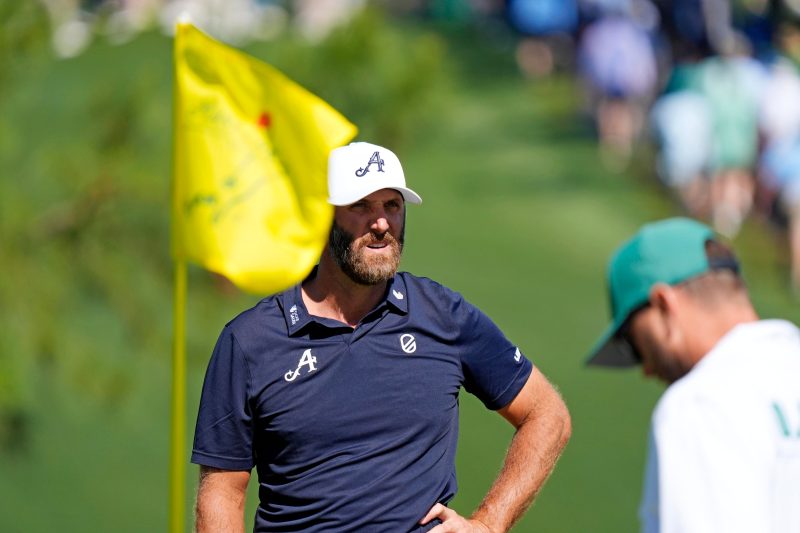AUGUSTA, Ga. – Nobody should ever, under any circumstances, feel bad for Dustin Johnson. The man won 24 times and $75 million on the PGA Tour, cashed out for another reported $125 million or so to go to LIV Golf and takes the private jet back to his $14 million house in Florida where Paulina Gretzky and their two kids will love him whether he shoots 65 or 85.
Life’s probably pretty good.
That’s a decent enough explanation for why Johnson, after finishing bogey-double bogey Friday to finish one shot worse than the projected cut line at the Masters, didn’t seem particularly frustrated about potentially going home early for the third time in the past five years. He was even genial, saying he felt pretty good about the way he was hitting the ball.
“I’m playing better than I scored for sure,” he said after signing for a 73, his 11th straight round here in the 70s.
But to follow Johnson around Augusta National these days is, frankly, a bit of a sad scene.
Here’s a guy who won this tournament five years ago at the COVID-delayed Masters for his second major championship, contended at about half the majors over a 10-year period and was just generally great at golf with a game that traveled to nearly any kind of course, under nearly any kind of conditions. You just assumed you’d see Johnson on the leaderboard because he always seemed to be there.
These days? Even here, at a place he won and once made five straight top-10s, he feels far more irrelevant than he should be.
There was a time not too long ago when you could have plucked two guys off nearby Washington Road, paired them with Johnson and drawn huge galleries anywhere because he was that big of a name and his powerful, majestic game was that spectacular to watch.
But in the context of what Johnson has done since signing with LIV – which is to say, almost nothing of note – Augusta National pairing him with Nick Taylor and amateur Justin Hastings for the first two rounds feels like a statement about his place in the game. And it’s not particularly good.
So the question is simple: Is the old Johnson ever coming back, or is one of the great careers of this century just effectively over from a competitive standpoint?
“All it takes is one good round though and it’s kind of right back into it,” Johnson said. “You know, for me, just got to clean up the mistakes a little bit. The game is in good form. Just got to limit the mistakes.”
One of those mistakes occurred on 18 when he blocked a drive way into the right trees, pitched out to the bottom of the hill, flew his third over the green, hit a mediocre chip to about six feet and slid the putt by on the right side. Just like that, his tournament was over, and it’s pretty typical of what’s gone on since he went to LIV.
Because Johnson’s body language on the course always has been nonchalant to the point of being aloof, it’s hard to read into very much other than the scorecard. But obviously something changed the moment he took a huge payday that didn’t require him to put up results. Did he lose his hunger? Did he stop working as hard as he used to? And will he ever get it back to the point where you think of him at every major as someone who can win?
Because it’s wild, given the career he’s had, that nobody thinks of him that way anymore.
“Golf is a funny game,” he said. “You (could) play the same round and shoot 4-5-under (or), as I did today, shoot 1-over. You know, just couple putts here and there drop and gives you a little momentum, a little confidence, it’s a different day.”
That’s true. But it’s more believable when you’re occasionally in the mix as opposed to cut, tied-43rd, cut, tied-31st, and cut at the past five majors.
And here’s the really scary part: Time is running out. Though Johnson will have a lifetime exemption to play this tournament as a past champion, he will only be able to qualify for two more US Opens and once more in the PGA and British on the five-year major exemption he earned at the 2020 Masters.
After that, there’s no automatic pathway for Johnson to get in those tournaments. With his world ranking in the 600s, he’d have to get some kind of special exemption or record a high enough finish in one of the majors to qualify for the following year (top-10 at the US and British opens, top-15 at the PGA get invited back). Unless things turn around – quickly – he’s going to be in real danger of just disappearing from major championships fields except for at the Masters.
In a couple months, the US Open will return to Oakmont where Johnson won his first major in 2016. It should produce some good memories. But it will also be a reminder of how far and how quickly he’s fallen.
“Hopefully the game is in really good form when you pull in,” he said. “I like the course. It’s right in front of you, but it’s just hard.”
For a player who used to make everything look pretty easy, what isn’t hard these days?
Follow USA TODAY Sports columnist Dan Wolken on social media @danwolken.bsky.social

